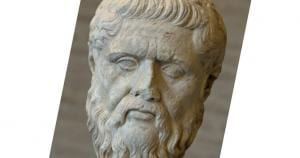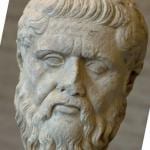When you argue with a friend, you try to be charitable, understand where he is coming from and where he is going. You understand that arguments go on, philosophy is long, and nobody is “winning” who sides with a major, significant worldview like materialism, idealism, or dualism. We do not live by surety, but by faith: a reasonable hope.
Then you meet a friend who has certainty or nearly certainty: one pal says “theism is certainly true” while another friend asserts that only an idiot would be a theist. That is not the way the world is, the just intellect lives by faith. Still, that very commitment means you must do the hard work of examining the friend’s case that he has triumphed, that he can easily answer an argument after a quick read.
Yet triumphalism has never proved out so far and I suspect will never do good until the end of time.
Triumph is easy once you decide you have triumphed … dismissing anyone who gets in your way. Go read the social media feeds of those sure that Jeremy Corbyn would win. When Labour critics pointed to contrary evidence, the pile on was fierce. Christians can be triumphalists too when they deny that problems, such as gratuitous evil, are as serious as they are. “Solutions,” the triumphalist shouts, “are here or on the way!” This is plausible (in the case of the problem of evil), but present solutions are not persuasive to many thoughtful Christians.
So it is with Mr. Williams, a well educated man of my generation, who is sure he is right or sure I am wrong and that everyone but his team of (first rate!) thinkers is an intellectual dead man walking.
Background on the Discussion (Link Loaded Summary, Very Skippable): What is going on?
 If we wish to follow the Logos where He leads, we need to listen to critics, especially those with interesting things to say. Jeff Williams is a critic of metaphysics. A University of Chicago grad, he agreed to present his argument and I have posted it here unedited (except for some formatting and the title). As result of his rejection of metaphysics, he rejects objective moral law as an illusion.
If we wish to follow the Logos where He leads, we need to listen to critics, especially those with interesting things to say. Jeff Williams is a critic of metaphysics. A University of Chicago grad, he agreed to present his argument and I have posted it here unedited (except for some formatting and the title). As result of his rejection of metaphysics, he rejects objective moral law as an illusion.
Mr. Williams previously argued that Athens has no need of Jerusalem, which contributes nothing good to Western civilization. I responded and enjoyed the interaction immensely. Mr. Williams has taken the time to discuss Martin Heidegger, a philosopher not much in favor when I was in graduate school. I have enjoyed reading more Heidegger (alas in translation). As usual, I allowed his post to stand without comment for a time and now here is a response. Mr. Williams suggested to me that I had not gotten him right, so it seemed decent and in order to let him respond. I suggested that Mr. Williams has ended up looking for a pony, because he has found a pile of LEGO blocks shaped like a pony.
Mr. Williams finds my response lacking, so I joyfully invite you to follow the argument where it leads. In this case, it leads to a sadly dogmatic physicalism (or materialism) that sees “gaps” or problems where there are none. We also learn that having a bad history of the philosophy of science can lead to some bad conclusions. Williams has come back to straighten me out. Sadly, I am not straightened out by this response, since I do not think Mr. Williams makes arguments. On the other hand, Williams is my friend, because he is honest, forthright, well read, and unafraid to speak what he thinks is true.
This is vital to the dialectic, the very basis of our finding the Logos, the Lord Jesus. My take on his fascinating assertions comes in two parts: one, two.
Mr. Williams felt I had done him wrong so he wished to summarize his credentials and his case. The first are impressive, the reader can decide on the merits of the second. Our reader or so will be delighted to discover that I will only have a brief response to this extensive rebuttal by Williams. We may then turn to Shakespeare!
Solidarity with Mr. Williams
We are told that secularists are declining globally as a share of the world wide population. Whatever else is true, the inability to sustain a culture is fatal to a worldview continuing as a player on the global political stage and secularism appears to be failing at this most basic task.
Solidarity with Mr. Williams if he finds himself in a global minority.
Williams responds he does not care, as he is only interested in the “West” and we are all entitled to our interests. And yet as the world changes, he may find that his best friends and allies are from the lands of ancient Aksum and Saint Thomas of India. We have been martyrs enough to know to stand with the minority when they become embattled.
He makes clear he had an enviable education as a young man and a splendid career as a grown man. I have never doubted it, even when he denied it!* Mr. Williams is a polymath and interesting which is why he has been worth reading at every turn.
Sadly, he is bad at argument, perhaps having spend too long away from foes worthy of his steel. My job has been to let him have his say, make his case that is all too common in men my age with a certain kind of education, and respond. Let me stress his intellectual patrimony is outstanding, his mentors excellent, and his choice of philosophers serious. My case has been to say that he makes too extreme a case and that this is dangerous.
He dismisses metaphysics, but philosophy departments have (generally) ignored his dismissal. He calls philosophy of religion “apologetics,” but very secular schools have missed his insight and hired philosophers of religion. He has declared dead what is alive, even if in the day, at his excellent (if eccentric) graduate program death seemed near.
Williams’ summary is a complete summary indeed, running to hundreds more words than I shall give myself. Why? I have pointed in my previous posts to articles, books, entire departments of metaphysics, that stand contra Williams. This naturally does not make his view wrong, merely his triumphalism.
And it is triumphalism that is dangerous.
On Triumphalism
There is a kind of theist, God forgive us all, that is sure of his rightness. He assumes that if an atheist just read his book, then all would be well. There would be no atheists.
Nonsense.
It is by faith, not intellectual certainty, that we are saved. There are good reasons to think Christianity true, but no conclusive reasons. There are good reasons to think Hope loves me, but that is not good enough if when I go down to her tonight she does not express love to me and I do not experience her affection.
It is reasonable to think she loves me and my experience confirms what reason suggests. There is experience to make me hope that Hope loves me and reasons that I can intellectually assent to my experience.
Reason and experience join to give me faith, reasonable hope, evidence of the unseen.
Within this view of reality, everything falls into place. The temptation is to forget what those outside of my experience and arguments see. I become cocksure and so fall into a vicious circularity of thinking. How could those idiots disagree?
So I think it is with Mr. WIlliams. He might be right. God knows we should take him seriously, but we cannot, because he takes himself too seriously. There is a case for his point of view, but his assertions are underdetermined. His evidence suggests “mayhap” and he proclaims total victory.
In the twentieth century, Martin Heidegger sided with the Nazis, either out of convenience or conviction. This brings humility to all of us in philosophy who are inferior to this brilliant intellect. One of the best of us failed the test of last century. We can quibble how badly he failed, but he failed badly.
That does not mean Williams is wrong. Williams is a good man and has nothing to do with the sins of his intellectual fathers. Yet the failures of Heidegger should warn any student of thought against triumphalism. The best of us can be a coward or a follower traveler. We must always, best we can, grant the Socratic niggle that we might be wrong and “they” might be right.
When anyone, Christian or atheist, is sure that “they” are stupid or dead or wrong, then those of us born in the bloody century, the 20th, must stop and say: “No. God, no. Not that again.”
Read Williams. His foes, myself included, are said by Williams to have missed the total triumph of his views. If you cite a counter example, those people are inconsequential. If you look to alternative ideas, even if held by most of the experts, then those experts are dismissed. If you appeal to a robust dissenting community, then you are reminded most agree with Williams. He is triumphant and that is the warning sign of gurus.
On Gurus
A mentor in graduate school said the program Mr. Williams attended, had a tendency to “guruism”. . .an intellectual certainty that betrayed the dialectic of Socrates and Plato. Few would deny this tendency in the brilliant Leo Strauss or the more dubious Allen Bloom.
This same teacher went to school with or studied under the many of the famous figures of the program at Chicago, but he left to go Johns Hopkins University, because so many had fallen into “guruism.” I enjoyed using the notes that Strauss gave my teacher on Genesis, but you could see the “we have it figured out” spirit even there.
They were not the last word, not even on Plato.
Williams may not have fallen for the particular gurus of the time. One hopes not, assumes not, yet Williams is setting himself up as a guru. What do I mean?
Williams dismisses his critics. He is triumphant. He takes his very important school of thought and dismisses worries, criticisms, alternative ideas mostly by asserting these are no longer worries or criticisms or valid schools of thought. I would hope as friends that Williams can see that theism did not vanish in philosophy, metaphysics is not dead, and that materialism/physicalism has serious problems. As a result, we keep doing philosophy and he should greatly lower his claims.
Corbyn might have won, after all, but he did not. Metaphysics might have died, maybe is really dead, but this is not only not obvious, but counter to the work now going on in philosophy.
Some Quibbles for this Good Man Too Long Out of the Arena
Williams has written many hundreds of words and I have tried to respond to him, trying to show that his case is out dated by facts on the ground in philosophy. At best, Williams represents one perspective and not the triumphant “win” he asserts on social media and in his first post.
I am not presenting a full positive case for my view, because if Williams had been right, there was no sense in it. If metaphysics is dead, God is dead, and this already known, why would I bother with a positive case? But philosophy, mainstream philosophy, does not know that metaphysics is dead, God is dead. Williams went to a good school in the day, retreated from philosophy to a very eccentric and excellent program at Chicago, and stopped work short of the doctorate. He made his pile and now wished to join the fray.
All well and good, but mayhap things did not turn out as young Williams thought they would. He asserts they did and no matter how many philosophers, scientists, programs at major secular universities disagree, Mr. Williams went to Chicago in the day and there were no (few?) Thomists there.
Maybe this was representative of philosophy then, maybe not, but we are under no obligation to think that it applies today. In fact, as we have seen, Thomists are everywhere, metaphysics is studied and discussed every place. Oxford can generate a modern bibliography for us to study. Stop. Go to the links, then realize Williams dismisses all this work as nonsense on nothing but his experience at Chicago, where he did not stay in philosophy, never finished his doctoral degree, and now asserts that all this work by world class philosophers in mainstream philosophy is worthless.
My claim is not that I am right, but that Williams is cocksure to the point of folly. This matters, God knows in real life it has mattered, in the twentieth and twenty-first century culture.
A Quibble on “Stuff” and Williams’ Science-Like Talk
Williams has not, perhaps, read critics charitably in some time so he becomes quite exercised by my use of “stuff” to describe what consciousness must reduce to in materialism/physicalism. First, I am merely using a term that translates Aristotle’s “ousia” and that term can mean matter, or informed matter, or form, or “plastic.” I use stuff when (unlike many materialists in history) I am reminded that we can no longer think of “matter” as having a certain definition.
He dismisses Aristotle (!) as if philosophers who use Aristotelian categories have not built on his work, developed his ideas, and modified them in the face of his errors. Thomas Aquinas did. Modern philosophers do. Williams should try to avoid chronological snobbery, the assumption that new ideas are better than old. The old ideas do not remain static, but if they find able defenders adapt over time.
One of my complaints about materialism/physicalism is that the definition of matter has become difficult. Materialism seemed most plausible when we thought we knew exactly what matter was, now we do not, but materialism endures. The situation grew dicey enough definitionally that some turned to the phrase “physicalism,” though the two terms often are used interchangeably. Whether called materialism or physicalism, problems have exploded and though most philosophers remain materialist/physicalists, the situation is rapidly changing.
Williams give us a long description of physics, which neither of us have the slightest credentials to address. My physics friends say he should have avoided the topic and I certainly should. Williams confuses “science words” (vibrations!) with common English analogues and this has been perilous for any public intellectual. See the mess made by public intellectuals with misuse of “chaos” and “relativity” in ethics.
Williams points us to a Forbes article so we can get modern physics. I have merely suggested that neither of us should try to explain modern physics especially based on a Forbes article.
I fear Mr. Williams also confuses the mathematical modeling of scientists with reality. Those doing the work warn us:
The philosophical implications of a theory dealing as this one does with the nature of emergent order and meaning in complex, hierarchically structured systems, should either be passed over altogether or dwelt on for longer than they are here. Greene might also have drawn attention to the limitations inherent in all of our mathematical and physical models of reality, and the need not to confuse them with reality itself.
If Williams wishes to claim that the play Hamlet reduces to a vibration, he is welcome to work on defending this. He should, however, stop quoting neuroscientists on the topic. Neuroscientists know about neuroscience and I would not dare argue with anything they say on that topic. There is no reason to think they know anything about philosophy or philosophy of science or even decent arguments for materialism/physicalism.
They may assume it for all I know in their work, but that does no harm. After all, they mostly may be socialists or Republicans, but economics and politics is not what they know. A good scientist knows how to do her job, but that does not mean she knows what “science” is or knows anything about the philosophy behind science. Here is a scientist/philosopher pointing all this out:
Practicing scientists pretty much want to know how to attack questions in their particular field of science. If your goal is to understand the digestive system of some exotic bug, you may have no use at all for a subtle account of scientific theory change, let alone for a firm stand on the question of scientific anti-realism. You have much more use for information about how to catch the bug, how to get to its digestive system, what sorts of things you could observe measure or manipulate that could give you useful information about its digestive system, how to collect good data, how to tell when you’ve collected enough data to draw useful conclusions, appropriate methods for processing the data and drawing conclusions, and so forth.
A philosophy of science course doesn’t hand the entomologist any of those practical tools for studying the scientific problems around the bug’s digestive system. But philosophy of science is aimed at answering different questions than the working scientist is trying to answer. The goal of philosophy of science is not to answer scientific questions, but to answer questions about science.
Materialism/physicalism may be true, but neuroscientists who do their work simply assuming it to be true are not expert. Of course, Williams also quotes relevant experts, but this does not show the case for materialism/physicalism is closed as he claims. Some (even most?) agree with him. Well and good.
Recall that I am not suggesting that materialists/physicalists should give up, are stupid, surely cannot solve the hard problem of consciousness. Maybe they can and Williams has given us a promissory note. All well and good, but this problem, combined with the difficulty of even seeing what matter is, has revived interest in philosophy for a minority in alternative ideas such as substance dualism or idealism.
After all, matter did not turn out to be what materialists thought it was at all. Mr. Williams can sound, at his worst, like a Star Trek writer throwing in some science words to add credibility. We both should avoid this temptation!
Quibble: Williams asserts numbers may not exist. Maybe Not or Maybe they do.
Mr. Williams says a good bit about numbers and whether they exist. Maybe they do not exist for some of the very reasons Mr. Williams suggests, but many (if not most) relevant experts think they do exist. I have pointed to some arguments for this, but my simple point is that Williams overstates his case routinely. Maybe materialism/physicalism is true. Maybe Williams’ take on ideas and numbers is true.
Maybe.
On some issues we have discussed most but not all scholars agree with Williams, sometimes, like on numbers, they do not. The one consistency with Williams? He learned the “state of play” in the day and is sure any other view is “stupid” or “medieval” or “apologetics.”
The discussion is not over by any means and that is what Williams keeps asserting with sweeping generalizations: Christianity (and Judaism!) contribute nothing and on top of it all are intellectually dead. We have seen over this discussion that both “guruish“ assumptions are almost surely wrong.
Quibble: I have always agreed: Nietzsche and Heidegger are important.
For some reason Mr. Williams gives us a list of important people influenced by Nietzsche and Heidegger as a rebuttal. Since I have never denied they were highly influential, I appreciate the list and would simply add: any philosopher who deals with areas they discuss takes note of them and must deal with their criticisms. Mr. Williams’ problem is not that he has picked obscure and unimportant philosophers to guide him, but that he denigrates any philosophers who do not agree with him (or Williams’ chosen mentors) that metaphysics is dead. It is not.
Quibble: Williams’ disputable history of philosophy
Williams has a view of his chosen experts that philosophy and science move on from views. One idea supplants another. Heidegger writes books and philosophy moves on from what came before Heidegger.
Maybe, but mainstream history of philosophy also can be pictured as schools of thought mostly adapting and interacting over centuries. Some ideas do die after a short life (Logical Positivism?), but most major schools of thought respond to critics, evolve, and keep looking for the truth. Thomism, for example, whether in the work of Rahner or the recently deceased Ferdinand Ulrich, responds to criticisms. Some Thomists do so by rejecting the criticism, others by adopting insights, but there is no evidence Thomism died.
Again, this is not to argue for Thomism (I am not a Thomist), but against the grossly simplistic view of the history of ideas that Williams asserts again and again. Some ideas die, some forms of a big idea become indefensible, but it is rare for a major system (materialism, idealism, dualism) to die or be supplanted for long. They develop, adapt, change, and so the certainty of the guru escapes us.
Quibble: Is Does Not Equal Ought Even with the MAGIC OF MAMMALS BRAINS!
Williams does not like the books of Leviticus and Deuteronomy. He fixates on them and so misses that progressive revelation, teaching people over time, must be true over the sixty-odd books of the collection called the Bible. The Scriptures of the Jews alone show that this is how God was working. One may attack the belief that God teaches us over time, but not ignore it for some sort of wooden, static, reading of the texts or odd aversion to the Old Testament.
Meanwhile, Christians read the Scriptures as I have suggested and used them as one aid, not the only one, in finding objective morality. The mostly Christian cultures he discusses were using Christianity to reach Dr. King’s beloved community.
Instead, Williams asserts morality “evolves” from “innate sensibility.”
Leave aside the misuse of “evolution,” (more science words!), and assume Williams is right and we have evolved some moral sensibility. Ignore that (say) Victorians got very different lessons from “evolution.” Assume again (out of charity) that Williams has the right sensibility and others (now alive!) who interpret things differently do not.
Why should we believe our sensibility? My ability to deny or question that sensibility (that exists) means that merely saying it evolved over time does nothing to advance the argument.
Williams on evolution:
Evolution, on the other hand, has been quite active. We have evolved from reptilian brains to mammalian, and among the various mammalian species we can see varying levels of empathy and caring that didn’t exist earlier. Evolution in fact did that.
Evolution is not a person. Evolution is a mindless mechanism. We see varying levels of empathy and caring, but we are also a killer species. Evolution did many things and Williams picks the ones he likes and ignores the ones he does not like for no given reason. When he begins to blame violence on “reptilian brains,” then he has gone off into just-so stories that do not help. Why prefer one “brain” to another or one trait always to another?
Assume he is right about “reptilian brains,” despite the evidence.
Saying the best killer in biological history predisposed to kill should be compassionate, because there is benefit to compassion says nothing. When? In what circumstances? Why should we act to the benefit of our species? We are capable of considering whether our species itself is bad. Why prefer our highly evolved (when compared to reptiles) ability for compassion to our highly evolved (when compared to the reptiles) ability to kill?
Heidegger could play footsie with the Nazis. Should he have?
Finally a Summary!
Williams at last summarizes his case and it is … fraught with peril.
Here is the first summary statement:
1. There is no physical or valid ground to assume that consciousness is not physically based. The assumption on which dualism rests is no more than mere speculation with no objective evidence, and therefore ungrounded.
Note the vicious circularity or vapidity of this statement. There can be no physical reason to assume that the soul is not physical if one is a physicalist. If only “physical” evidence (undefined!) counts as evidence, then there will never be any evidence a non-physical object exists.
Williams may suspect this problem as he adds “valid ground.” This adds nothing as “validity” is a term of logic, not truth. What is “objective evidence?” That is going to be only physicalist evidence given Williams’ prior assumptions.
This is tediously true: Dualism is ungrounded if physicalism is true. Physicalism is simplistic if dualism is true.
All Williams has done is assert that if he is right, then he is right.
Williams then asserts:
2. The result of this assumption is a metaphysical illusion that contradicts itself in the unresolvable interaction problem.
Mostly this is name calling. I reference a work that deals with the “unresolvable” intersection problem. Williams ignores that source. Maybe the solutions proposed in modern dualism do not work, but atheist non-dualists are not convinced this is true as Williams would learn if he had kept up in field.
3. A shift to an assumption of a physical basis eliminates this unsolvable contradiction and moves to a paradigm with more promising questions focused on the similarity between quantum events and consciousness asemergent from the wave activities in the brain.
Scholars have proposed solutions to the “unsolvable contradiction.” Technobabble from either of us is useless. Maybe physicalism is true, mentors thought so, but hand waving using “science words” while dismissing alternative points of view is not (as we have seen) helpful.
4. With no longer a need to resort to god explanations, we can focus on what has actually occurred in morality, which negates any notion of objective and timeless morality, and most especially the failure of the Bible as a presentation of objective moral law since much of its law has been rejected by refined moral temperaments. This does not necessarily lead to an arbitrary moral relativism, but one that is grounded in our nature.
Note this: “We can focus on what has actually occurred in morality.”
Assume Williams is right.
So?
That is what some of us have done. Should we have?
Williams has done nothing to solve the “is” and “ought” problem other than add some science words and bravado.
What has happened “negates the notion of objective and timeless morality” says Williams. Why? Which culture? Who? India? China? Britain? The United States? Which part of the United States? Is Williams just assuming his class is somehow evolutionary superior and “gets it?” Why?
Truth does not change, but we might think some truths false while grasping others. Over time, we might reject our old errors while making new ones. How does ‘evolution’ help us with this?
Finally, Mr. Williams asserts “refined moral sentiment” agrees with Mr. Williams. This is convenient for Mr. Williams, but who defines “refined?” Is it the highly educated atheist running education camps in China? Is it the Hindu scientist in India? Is it the highly educated Baptist scientist in Alabama? Is it the Kenyan film critic in government?
Maybe refined moral sentiment belongs to former Lutherans who went to Chicago in the day, made their pile, and now are public intellectuals. Maybe not.
My bet is that “refined” is just another word for “people who agree with me and also went to the right schools.”
————————————
*(Claiming with puckish zeal to be a “mere” biker under a bridge. Of course, a biker roommate in college was quite brilliant, so I was not sure why he viewed that as a modest claim!)













